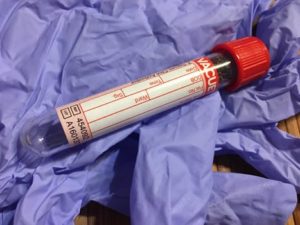
If you run in food allergy circles, I’m sure you have heard about the Netflix Original series called “Rotten.” This six-part look into the food industry has certainly ruffled feathers in our little world. There are many who are unhappy about the focus of episode two, titled “The Peanut Problem.” One thing I have heard a lot is “why the focus on peanuts?” Some are asking about the funding of the project, produced by Zero Point Zero. I like a good conspiracy theory as much as the next person, so I was really curious to see what I could find out about this series. I started digging, and it didn’t take long to find some things I thought were interesting.
Many in the food allergy world who watched it only watched the one episode out of the six. I’ll raise my hand too—that’s what I did. While I’m pretty up on food industry workings, we’ve had a lot of snow days this year, so I haven’t had a lot of extra time to sit and watch a six-part series. We sat down and checked out just this one episode and I was left with a pretty neutral opinion of it. There were little pieces here and there that kind of irked me, but overall it was fine. I did not run to the interweb to voice my objections or praise. I was left feeling kind of like “well, that was interesting.” I wasn’t shocked at the outspoken views when I did finally check out Facebook and Twitter. As they say, you can’t please all of the people all of the time.
After reading all the hubbub from stats to financing, to who said what, I hit the Google machine. It really didn’t take much digging at all to find out what I thought was interesting.
First off, the question of “why peanut?” There seems to be a lot of “us vs. them” in the allergy world. While I know I won’t change that with one blog post (oh, but if only!) there is a really good explanation on why. The series in its entirety was made to highlight criminality in the food industry. Had I watched the entire series, I may have picked up on that, but again—time. In the U.S., there aren’t criminal cases against restauranteurs over adulterated ingredients. They went to the U.K. to specifically cover the case against the restaurant owner who, knowingly and for financial gain, changed from using ground almond to ground peanut in their curries. This was why they focused on peanuts in the series.
I have also seen people feel that they shouldn’t have introduced the peanut farmers. They say things like “I don’t feel sympathy for them!” I can understand this visceral reaction to seeing something that can instill fear into so many of us. We too are a peanut allergic family. We live it too. I DO understand that fear. I also understand this is their livelihood. This is what they know and how they earn a living. I understand my family is (thankfully) in the minority. I understand that there are families for whom peanut butter is a cheap, easy, shelf-stable, portable protein. It’s not us vs. them (peanut farmers or other allergy families), it’s a teachable moment. Like all things in life, we need to work together to help find solutions, to co-exist and to do it safely.
This series was a Netflix exclusive. I have heard grumblings that there could be nefarious financial deeds happening behinds the scenes. While I have no idea how the film industry works (perhaps I’m being Pollyanna about this), I don’t see who would have enough money to get themselves into this 6 part series. Again, perhaps I’m being naive, but I have to imagine it would be a lot of money. Like, a LOT.
My overall thought is that this was interesting from the criminality aspect of the industry. Chef Ming Tsai (full disclosure: he helped my kiddo get over a very large allergy-related hurdle, so I feel indebted to him 😉 ) made some amazing points to the industry. They NEED to know what is in the food they are serving, or they need to get out! I think I’m pretty much in agreement with the masses in our circle that he was the standout of the show. I know people seem to be really pro or against it, but I just came away with “Huh. Interesting point of view and well done.” I think they did try and add things in that didn’t belong because it kind of muddled the intent of the show but again, overall it was a decent watch. It’s a great conversation starter too. With over 54 million subscribers in the US alone, the potential for getting even the word allergy out there to the masses beyond our circle is something that can get more people talking.

